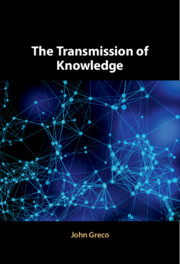Book contents
- The Transmission of Knowledge
- The Transmission of Knowledge
- Copyright page
- Contents
- Preface
- Acknowledgments
- 1 Introduction
- 2 The Framework Presented
- 3 Joint Agency and the Role of Trust in Testimonial Knowledge
- 4 Social Norms and Social Sensibilities
- 5 A Unified Account of Generation and Transmission
- 6 The Framework Extended
- 7 Education and the Transmission of Understanding
- 8 Reductionism and Big Science
- 9 Social Religious Epistemology
- Appendix: The Garbage Problem
- Bibliography
- Index
2 - The Framework Presented
Testimonial Knowledge and the Flow of Information
Published online by Cambridge University Press: 21 August 2020
- The Transmission of Knowledge
- The Transmission of Knowledge
- Copyright page
- Contents
- Preface
- Acknowledgments
- 1 Introduction
- 2 The Framework Presented
- 3 Joint Agency and the Role of Trust in Testimonial Knowledge
- 4 Social Norms and Social Sensibilities
- 5 A Unified Account of Generation and Transmission
- 6 The Framework Extended
- 7 Education and the Transmission of Understanding
- 8 Reductionism and Big Science
- 9 Social Religious Epistemology
- Appendix: The Garbage Problem
- Bibliography
- Index
Summary
Chapter 2 introduces an “information economy” framework for approaching the epistemology of testimony. It is argued that, in a well-designed epistemic community, the norms governing information acquisition and information distribution will be different. This is because the dominant concern of information acquisition is quality control, whereas the dominant concern of information distribution is to provide access. The central idea, then, is to understand knowledge generation in terms of the norms governing information acquisition and to understand knowledge transmission in terms of the norms governing information distribution. The reason for adopting this approach is its explanatory power.In particular, the framework (a) explains a range of cases in the testimony literature; (b) provides a principled understanding of the transmission–generation distinction; and (c) explains the truth behind various and conflicting positions in the epistemology of testimony. Moreover, the framework nicely integrates with other plausible positions in epistemology, the philosophy of language, action theory, social science, and cognitive science.
Keywords
- Type
- Chapter
- Information
- The Transmission of Knowledge , pp. 25 - 46Publisher: Cambridge University PressPrint publication year: 2020

